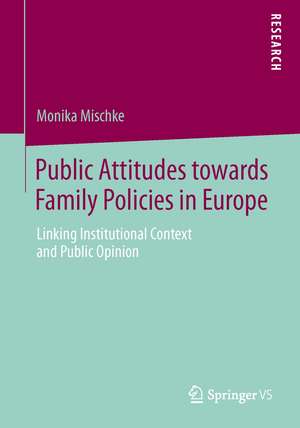Public Attitudes toward Family Policies in Europe: Linking Institutional Context and Public Opinion
Autor Monika Mischkeen Limba Engleză Paperback – 13 sep 2013
Preț: 382.95 lei
Nou
Puncte Express: 574
Preț estimativ în valută:
73.28€ • 76.71$ • 60.63£
73.28€ • 76.71$ • 60.63£
Carte tipărită la comandă
Livrare economică 07-21 aprilie
Preluare comenzi: 021 569.72.76
Specificații
ISBN-13: 9783658035761
ISBN-10: 3658035765
Pagini: 240
Ilustrații: 240 p. 10 illus.
Dimensiuni: 148 x 210 x 13 mm
Greutate: 0.3 kg
Ediția:2014
Editura: Springer Fachmedien Wiesbaden
Colecția Springer VS
Locul publicării:Wiesbaden, Germany
ISBN-10: 3658035765
Pagini: 240
Ilustrații: 240 p. 10 illus.
Dimensiuni: 148 x 210 x 13 mm
Greutate: 0.3 kg
Ediția:2014
Editura: Springer Fachmedien Wiesbaden
Colecția Springer VS
Locul publicării:Wiesbaden, Germany
Public țintă
ResearchCuprins
Introduction.- Theoretical background and literature review.- Family policies in Europe - a cluster analysis.- Family policies and public opinion.- Family policy, contextual features, and public opinion.- Social cleavages within European welfare states.- Summary and discussion.
Notă biografică
Monika Mischke holds a PhD in sociology from the University of Mannheim and is currently working as a postdoctoral research fellow and lecturer at Siegen University.
Textul de pe ultima copertă
Family policy variation in Europe is still enormous and there is very limited knowledge about the publics´ attitudes toward family-policy measures in a comparative perspective. Monika Mischke addresses this research gap by combining a profound analysis of existing family-policy measures with a thorough analysis of public attitudes. Based on institutional theory, which argues that institutions structure the process of orientation, the empirical analysis sheds light on the relationship between the current family-policy setup, the social context, and public attitudes toward particular family-policy measures in 12 countries of the European Union. The results demonstrate that the social context needs to be taken into account in order to improve our understanding of attitudinal variation among different countries and family-policy contexts. Moreover, the author points out that only a few patterns of social polarization are quasi universal, whereas many others are specific to individual countries or certain groups of countries.
Contents
Monika Mischke holds a PhD in sociology from the University of Mannheim and is currently working as a postdoctoral research fellow and lecturer at Siegen University.
Contents
- Theoretical background and literature review
- Family policies in Europe – a cluster analysis
- Family policy, contextual features, and public opinion.
- Social cleavages within European welfare states
- Scholars and students of social policy, sociology, political science, and social work
- Practitioners involved in policy making and evaluation, interest groups, and welfare organizations
Monika Mischke holds a PhD in sociology from the University of Mannheim and is currently working as a postdoctoral research fellow and lecturer at Siegen University.
Caracteristici
Publication in the field of social sciences Includes supplementary material: sn.pub/extras











